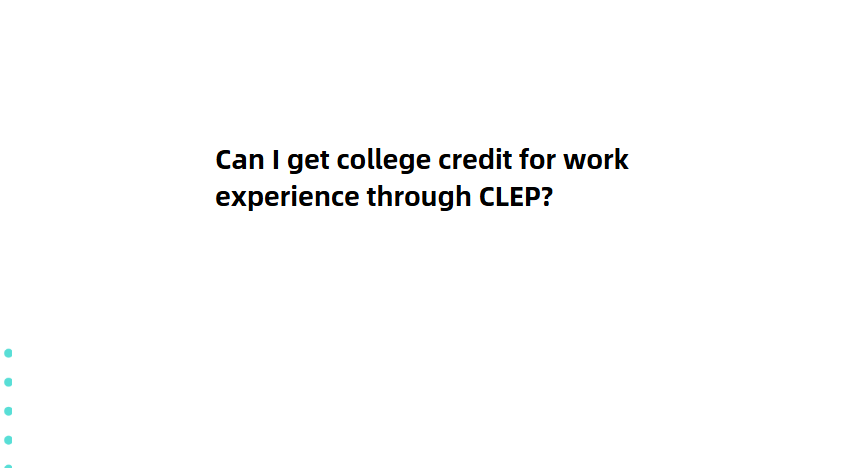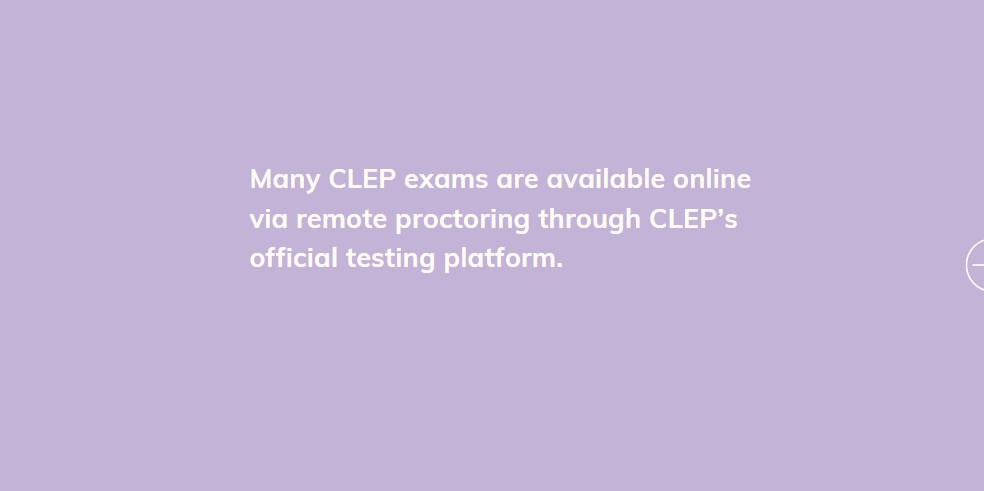Are you wondering if your years of work experience can help you earn college credit and save time and money? You’re not alone. Many adult learners, career changers, military members, and working professionals ask the same question: Can I get college credit for work experience through CLEP?
The short answer is yes, you can earn college credit for your knowledge, and one of the most flexible and affordable ways to do that is by taking CLEP exams.
We understand that every student’s journey is unique. Whether you’ve been in the workforce for years, served in the military, or are returning to school later in life, CLEP exams can help you turn your real-world experience into real college credit.
Let’s explore how it all works and how you can use CLEP to get ahead.
What Is CLEP?
CLEP stands for the College-Level Examination Program, a credit-by-exam program developed by the College Board (the same organization behind the SAT). CLEP allows students to demonstrate college-level knowledge in a subject and earn college credits without sitting through an entire semester-long class.
There are over 30 CLEP exams available in subjects like:
-
College Algebra
-
Chemistry
-
History
-
Psychology
-
Business
-
Composition
-
and many more
Each exam typically takes 90-120 minutes and costs a fraction of what a college course would cost.
Can Work Experience Help Me Pass a CLEP Exam?
Absolutely. That’s one of the major reasons CLEP exists.
Many people gain valuable skills and knowledge through on-the-job training, military service, industry certifications, volunteer work, or personal study. If you’ve been working in a particular field or have developed expertise in a subject, you may already know enough to pass a CLEP exam even if you’ve never taken a college course in that area.
Here’s an example:
Let’s say you’ve worked in accounting for the last five years. You probably understand financial terminology, balance sheets, and budgeting principles. Instead of starting from scratch in a classroom, you could take the Financial Accounting CLEP exam and possibly earn 3 or more college credits in one day.
How Many Credits Can I Earn Through CLEP?
CLEP exams typically offer 3 to 6 college credits per test. Some schools allow up to 30 or more credits via CLEP, which is equivalent to an entire year of college.
However, it’s important to check with your target college or university. Each school sets its own CLEP policy, including which exams they accept, how many credits they’ll award, and the minimum passing scores.
Pro tip: CLEP credits are most often applied to general education or introductory courses, freeing you up to focus on major-specific classes later.
Why Choose CLEP for Earning College Credit?
Here’s why CLEP is a top choice for students with work experience:
-
Save Time: Skip courses you already know and graduate faster.
-
Save Money: Exams are affordable usually under $100.
-
Test Anytime: Many testing centers and online options are available year-round.
-
Flexible Subjects: Choose from a wide range of academic fields.
-
Recognized by 2,900+ Colleges: CLEP is widely accepted across the U.S.
If you’re balancing school with a job or family, CLEP offers a practical and efficient way to earn your degree on your terms.
How to Get Started with CLEP
If you're thinking, “This sounds perfect for me!”, here’s how to begin:
-
Review Your Experience
Identify what subjects you have real-life experience or training in. Think broadly from workplace tasks to military roles. -
Match It to a CLEP Exam
Visit the official CLEP exam list or contact us at takemyclepexam.com for guidance on which tests align with your background. -
Prepare (if needed)
Some students pass CLEP exams without study, but brushing up on test topics can boost your confidence. Use free online resources, CLEP study guides, or reach out to our experts for help. -
Register and Take the Exam
Schedule your test at a CLEP-approved testing center or online with remote proctoring. -
Send Your Scores
Once you pass, send your scores to your college and let them do the rest!
How We Can Help
We support students through every step of their credit-by-exam journey , with CLEP and other testing options. Whether you’re unsure which exam to take, need study help, or want someone to guide you through the process, we’re here to help you succeed.
Frequently Asked Questions (FAQs)
Q: Can I take a CLEP exam based solely on work experience?
A: Yes. If your work experience has given you knowledge in a CLEP subject area, you can take the exam without any formal classroom instruction.
Q: Is there a limit to how many CLEP exams I can take?
A: No official limit, but your college may have a cap on how many CLEP credits they will accept typically around 30 credits.
Q: Do all colleges accept CLEP?
A: No, not all. However, over 2,900 colleges and universities do. Check your school’s CLEP policy before you take the test.
Q: Can I take CLEP exams online?
A: Yes, many CLEP exams are available online via remote proctoring through CLEP’s official testing platform.
Q: What score do I need to pass?
A: Most schools accept a score of 50 or higher on a scale of 20 to 80, but passing scores can vary by institution.
Q: How long does it take to get results?
A: Most CLEP exam scores are available immediately after testing, except for those with essays (like College Composition), which take longer.
Q: Can military members take CLEP exams for free?
A: Yes. Through the DANTES program, active-duty military members can often take CLEP exams at no cost.
Final Thoughts
Turning your work experience into college credit doesn’t have to be complicated or expensive. CLEP gives you the opportunity to skip what you already know, save money, and move forward faster.
We’re passionate about helping students just like you earn the credit you deserve. Whether you're looking to test out of general education classes, speed up your degree, or simply make the most of your professional background, CLEP can be the key to unlocking your academic success.
Ready to start your CLEP journey? Let us help you every step of the way. Visit takemyclepexam.com today and take the first step toward earning credit for what you already know.


